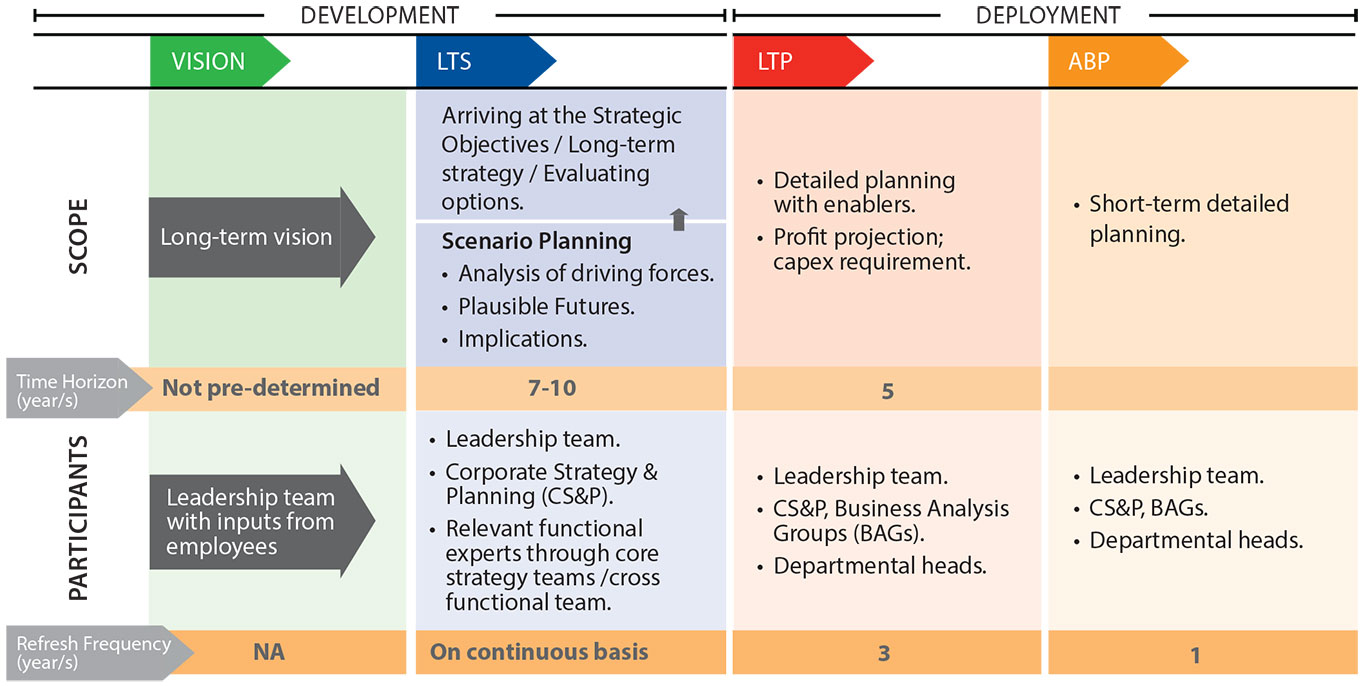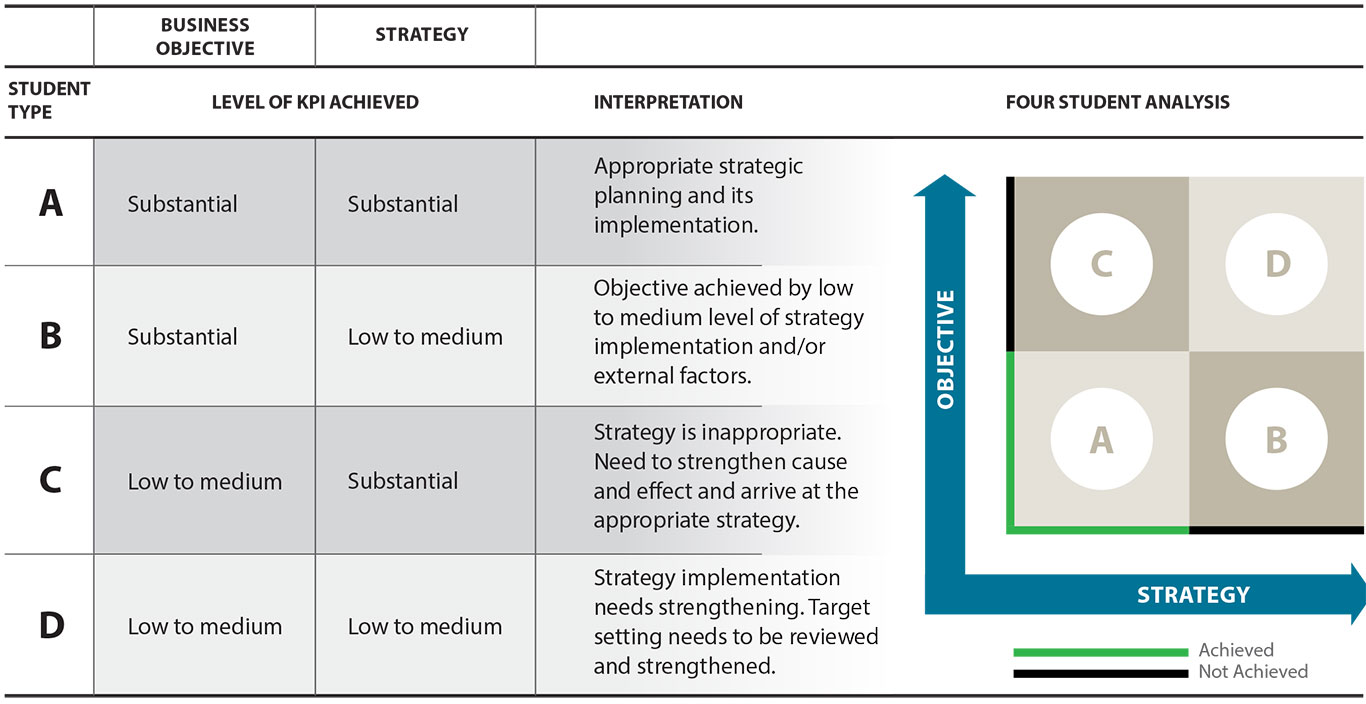Strategy Planning and Deployment Process
We follow an Integrated Strategy Planning and Deployment process through which the planning and deployment is standardised across all our business processes and the value chain described under our Business Model.
It is a four - tiered approach which consists of the following two phases:
- Development Phase:
We set our Vision and Strategic Objectives and also the Long-term Strategies (LTS) to achieve them. - Deployment Phase:
Strategies are converted into action plans through the process of Longterm Planning (LTP) and Annual Business Planning (ABP). Further, during this phase, requisite resources are allocated to achieve the stated objectives.
Integrated Strategy Planning Process
for Strategy Formulation and Resource Allocation

Planning and time horizons are defined for each, based on the lead time for action and urgency required to effectively respond to deviations in the external or internal environment. Strategic objectives are an outcome of the Strategic Planning Process.
The Company’s strategies are clearly linked to its Vision, Mission and Values. The planning process takes cognizance of both external and internal business environment and suitably factors the opportunities, challenges and past learnings. The overall strategies and plans are cascaded down to individual divisions/ departments with clearly defined responsibilities, connected to the last mile with employees’ Key Result Areas.
Strategy Governance process
The strategy governance process enables
us to identify and test the robustness of
our strategic initiatives against possible
scenarios in the future. Strategic projects
identified through this process are
evaluated and approved by the Strategy
Committee and then are included in the
Long-term Planning Process for execution.
Resource allocation to implement
strategy
We have a business planning framework
that enables us to identify the resources
(IT, HR, Finance) required for achieving
our stated strategic objectives. Functional
teams take suitable actions in ensuring
the availability of resources and these resources are allocated through the
process of LTP and ABP. We also have a
five year capital expenditure plan which is
aligned to our LTS and LTP.
Measuring achievements and target outcomes
We use the ‘4 Student Analysis’ tool
to measure the effectiveness of the
strategies deployed and action plans.
Key Performance Indicators (KPI) are
identified for all objectives, strategies and
action plans. The ‘4 Student Analysis’ also
helps us to evaluate the KPIs for actions
and objectives at various levels in the
organisation and to assess if relevant and
sufficient interventions were deployed to
achieve the objectives.
Tracking Strategies and Plans
To enable the Company to respond with
agility to changes in the environment,
the progress of the strategies and plans is
tracked periodically through various MIS
/ dashboards and reviewed at defined
intervals by the apex level review forums.

1. The Managing Director leads the following meetings / forums:
On a Monthly basis
- a. Meeting to review the monthly production target versus the plan and discuss areas of operational issues, KPIs, and service delivery performance to the customer.
- b. Meeting to review market trends, customer needs and expectations, business results and top priorities of ABP.
On a Bi-Monthly basis
Apex Environment Forum to review and
discuss the Company’s Environmental
Performance.
On a Quarterly basis
Meetings with the Quality Board, Apex
R&D, Apex Safety Committee, Apex HRD,
Apex CSR Steering Committee to review
and address areas of Quality, R&D and Innovation, Safety Performance, Human
Resources, CSR activities and policy
respectively.
2. The Managing Director / President lead the following meetings / forums:
On a Monthly basis
- a. Meeting to review the cost and operating KPIs, strategic cost management, benchmarking and competitors’ analysis, and top priorities of ABP.
- b. Meeting to review improvement in savings for reaching the 25% EBITDA target without captive raw materials.
On a Quarterly basis
Meeting with apex forum to discuss
strategic projects.
3. The Managing Director / President / Vice President lead the following meetings / forums:
On a Quarterly basis
- a. Meeting to review the status of key projects and the enablers critical to the attainment of LTP.
- b. Peer Review Group & Capital Expenditure Committee (CEC) meeting to review capital management and growth.
Challenges and opportunities arising from the Business Environment in FY16
During the year, we faced several challenges such as uncertainties in the external environment, excess supply of steel coupled with weak demand globally, increased imports of steel from China into India at unsustainable prices, steep decline in steel prices (in dollar terms) with international HRC prices plummeting to the 2003 levels, uncertainties around mining operations and higher costs owing to regulatory changes (such as contribution to District Mineral Foundation and National Mineral Exploration Trust).
In response to the challenges faced, greater priority was accorded to operational excellence through Shikhar-25, the accelerated improvement programme, maintaining cost leadership, focusing on product and service differentiation/ downstream business and safe, steady stabilisation and ramp-up of the Kalinganagar Plant.
Medium term strategic objectives/goals
In the medium term, our key focus areas will be:
Leadership position in profitability
Growth
Product & Service differentiation
Benchmark in Corporate Citizenship – Safety, Health and Environment
Impact based Corporate Social Responsibility
Strategic objectives (medium to long-term)
and key strategies pursued in FY16
| Area | Strategic Objectives (Medium to Long-Term) | Strategy / Action | Capitals Impacted |
 |
Maintain leadership position in chosen segments | Build and maintain the leadership position in new and existing chosen segments | Financial
Social and Relationship Manufactured |
| Improve product mix and service differentiation | Timely commissioning and faster ramp up of Kalinganagar Plant Phase 1 | Manufactured Financial | |
| Maintain leadership position in profitability | Achieve operating profit as per plan | Financial Manufactured | |
| Shikhar - 25 – double the pace of improvement | Financial Manufactured | ||
| Increase employee productivity through structural improvements | Human Manufactured Financial | ||
| Strive for raw material self-sufficiency and extract value from waste | Ramp up of Khondbond mine (Iron Ore) and West Bokaro mine (Coal) | Financial Manufactured Natural | |
| Organic growth at 25% below baseline costs | Ongoing projects related to savings from approved capex | Financial Manufactured | |
| Leverage digital across value chain | Identify and prioritise digital opportunities | Intellectual Manufactured | |
| Zero injury to workforce – Committed to Zero | Initiate safety leadership development, eliminate rail and road incidents, eliminate contractor induced risks | Human Social and Relationship | |
| Be the steel industry benchmark in India for environment performance | Installation / augmentation of fugitive dust extraction/ suppression systems | Natural Social and Relationship | |
| Solutions for solid waste utilisation | Natural Financial | ||
| Achieve a Zero Water Discharge regime | Natural Social and Relationship | ||
| Deliver impact based CSR | Improve access to health, education and livelihood opportunities for communities in the areas where we operate | Social and Relationship | |
| Employer of choice in the metal and mining industry in India | Diversity and Inclusion, capability building through learning and development | Human Social and Relationship |
Focus Areas
As we move forward, we work towards:
1. The ramp up and stabilisation of Phase 1 of our Kalinganagar Plant.
2. Scale-up our differentiated services and solutions to customers.
3. Improve despatch cost by reaching benchmark performance in KPIs; reduction in procured raw material and services cost.
4. Seed digital initiatives via organisation-wide mobilisation, pilots and capability building.
5. Continue to be a benchmark in environmental performance by reducing CO2, Dust Emission and increase Solid Waste Utilisation.
6. Continue with the “Committed to Zero” principle to improve the safety performance.
7. Improving employee productivity through various capability building initiatives.
8. Engage on Policy Advocacy.
9. Touch the lives of people through strong focus on livelihood, education and health as part of our Corporate Social Responsibility
activities.


